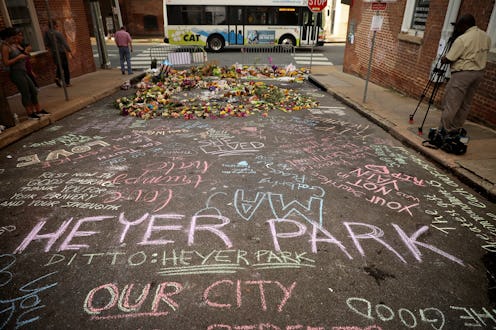News
Charlottesville Has Elected A Black Woman As Mayor For The First Time Ever

In August 2017, white nationalists descended on a college town in Virginia for a rally that turned violent, sparking the explosion of a national reckoning with racism in the U.S. On Tuesday, not five months after that deadly white nationalist rally, Charlottesville elected Nikuyah Walker as mayor, the first time the city chose an African American woman for the position.
The Charlottesville City Council elected Walker, an Independent, by a 4-1 vote to succeed outgoing mayor Mike Signer on Tuesday night. While her title is largely ceremonial, it's also hugely symbolic. On Aug. 12, thousands of white nationalists stormed Charlottesville with Nazi insignia and flaming tiki torches to protest the removal of Confederate Gen. Robert E. Lee's statue in a park. This came amid growing consensus in towns and cities across America that Confederate monuments were symbols of white supremacy, and it was time for them to fall.
That Walker was elected mayor of the progressive college town so soon after the rally has been hailed by some as a monumental response to white supremacy across the country. (Charlottesville's government is so that an elected council elects the city's mayor and vice mayor, rather than the residents.) It's also not the first time she's made history there — in November, Walkers was also the first Independent candidate to be elected to the Charlottesville City Council since the 1940s.
Some have said that the Charlottesville rally is indicative of how white supremacists across the country have been emboldened by Trump's election. At the rally, a prominent member of the KKK said that they were there to "fulfill the promises of Donald Trump."
The rally turned violent as white nationalists clashed with counter-protestors, then deadly when one of the rally-goers rammed his car into a crowd of counter-protestors, killing a 32-year-old Charlottesville woman, Heather Heyer.
The white nationalist rally in Charlottesville caused national outrage, and the anger was further stoked when President Trump failed to condemn neo-Nazis and white nationalists in his speech about the incident, saying that there was "hatred, bigotry and violence on many sides."
The backlash came quick and Trump backtracked, but days later defended his original comments. “I think there is blame on both sides,” the president said. “You had a group on one side that was bad. You had a group on the other side that was also very violent. Nobody wants to say that. I’ll say it right now.”
Walker has been a vocal critic of the way the city's leaders handled the response to the white nationalist rally. Last month, an independent review of the rally by a former U.S. attorney in Virginia reported on the multiple mistakes that led to heightened tensions at the Charlottesville rally, including poor planning, a failure to anticipate violence, and a lack of coordination, among other things.
During a council meeting days after the rally, Signer, then the current mayor who was the public face of the city, Walker ripped into the authorities for allowing the rally's organizers to get a permit and the police for failing to deal with the violence. "Why did you think that you could walk in here and do business as usual after what happened on the 12th?" she asked.
The position of mayor at Charlottesville is part time, and Walker will preside over council meetings. Heather Hill, a Democratic councilor, will be vice mayor.